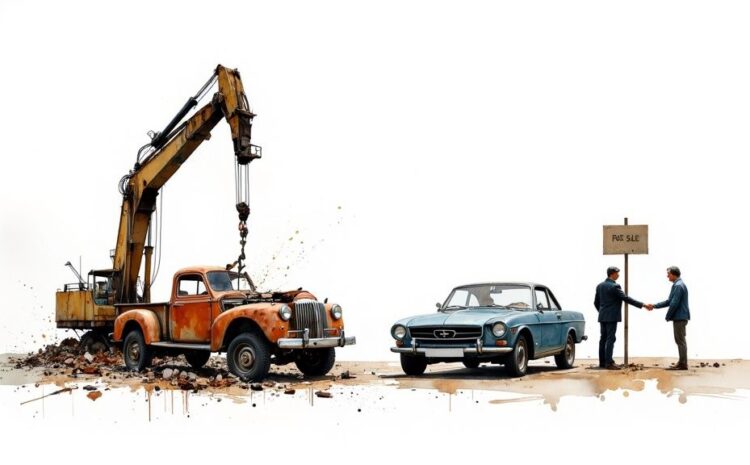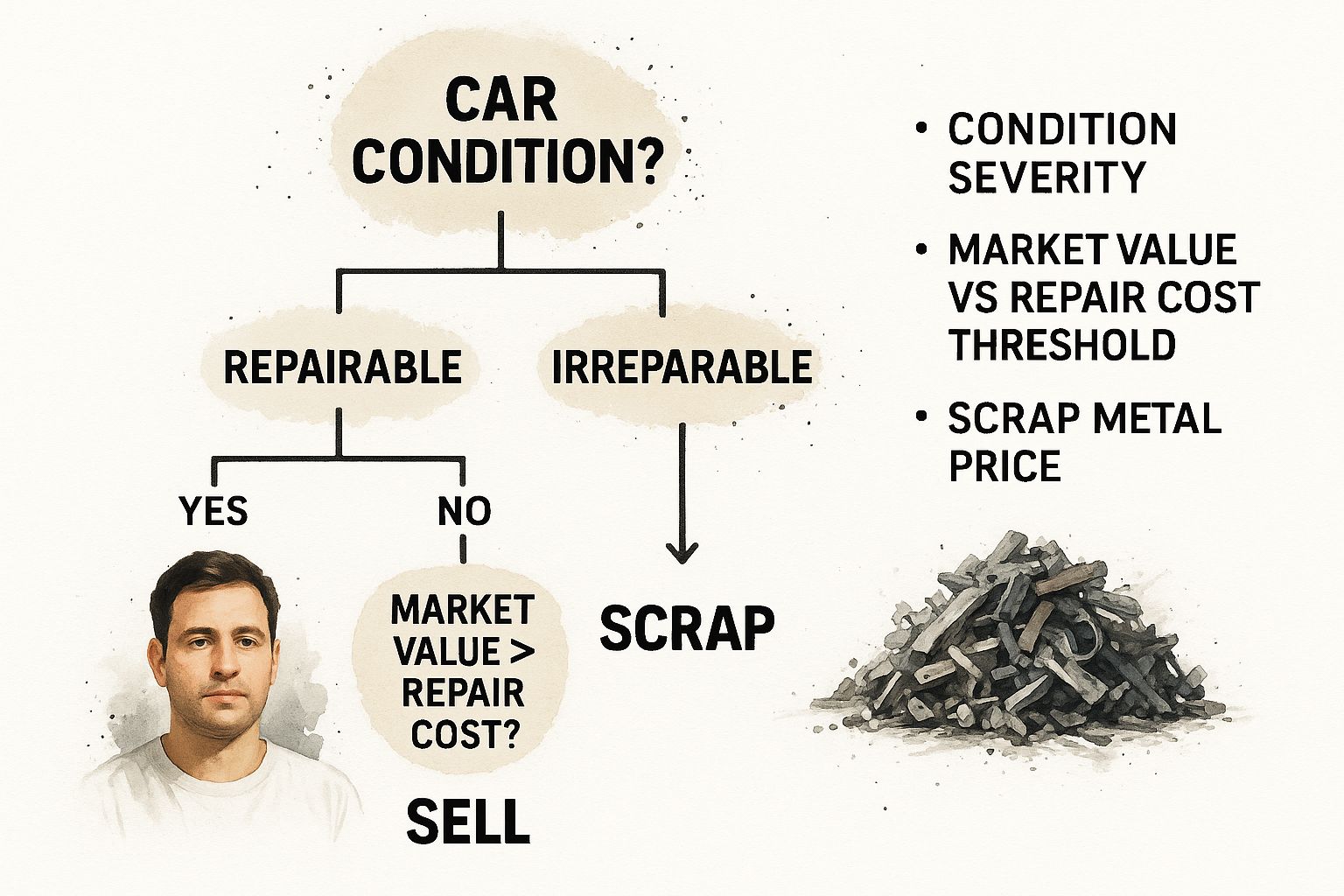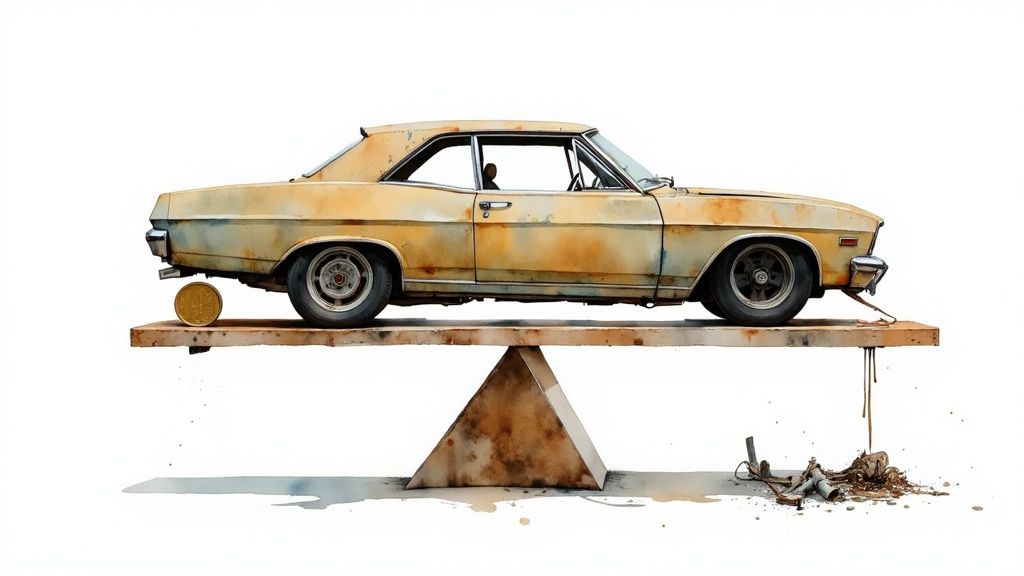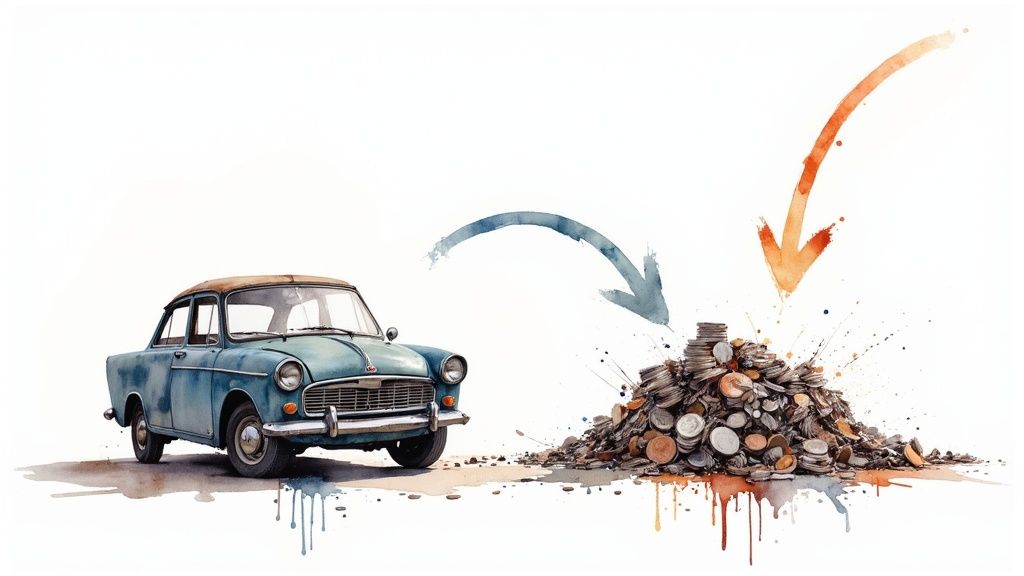
Scrap vs Sell: What’s Better for an Old or Damaged Car? UK Guide
When it's time to part ways with your car, the big question is whether to scrap it or sell it. The right answer really comes down to the car's condition and how quickly you need it gone. If you're dealing with a vehicle that's been in a major accident or is a non-runner, scrapping is often a quick and guaranteed way to get some cash.
On the other hand, if your car is just a bit long in the tooth but still runs well, or has issues that are relatively cheap to fix, you'll almost certainly get more money by selling it privately. It just takes a bit more time and effort on your part.
Scrapping vs Selling Your Car: What's the Best Choice?
Figuring out what to do with an old or damaged car can feel like a headache, but it’s really just a trade-off: speed and convenience versus a bigger payout.
Scrapping is the default option when a vehicle has truly reached the end of the road. We're talking catastrophic engine failure, serious accident damage, or an MOT failure where the repair bill is more than the car is worth. Going the scrap route is straightforward and fast, giving you a guaranteed payment based on your car's weight and the going rate for scrap metal.
In contrast, selling is your best bet if there's still some life left in your old motor. Even a high-mileage car with a few minor mechanical quirks will almost always be worth more on the open market than it is to a scrapyard. Of course, this path requires more from you—you'll need to clean it, take good photos, write a compelling advert, and handle enquiries from potential buyers. But that extra legwork usually pays off with a much better price.
To make the right call, you need to be honest about your car's condition and what you're willing to put into the process.
- Convenience and Speed: Need the car gone yesterday with zero hassle? Scrapping is the clear winner.
- Financial Return: If getting the most money possible is your top priority and you've got the time, selling is the way to go.
- Vehicle Condition: This is the deal-breaker. A non-runner with a rusty frame is destined for the scrapyard, but a reliable older model is perfect for a private sale.
To help you decide at a glance, here’s a quick summary of the key points.
Scrap vs Sell Quick Decision Guide
| Factor | Scrapping Your Car | Selling Your Car |
|---|---|---|
| Best For | Non-runners, accident-damaged, MOT failures, end-of-life vehicles. | Roadworthy cars, models with minor faults, classic or desirable models. |
| Payout | Lower, based on weight and scrap metal prices. | Higher, based on market value, condition, and demand. |
| Speed | Very fast – often within 24-48 hours. | Slower – can take days, weeks, or even months. |
| Effort | Minimal. The scrap company handles almost everything. | High. Requires cleaning, advertising, viewings, and negotiation. |
| Guarantees | Guaranteed sale and payment. | No guarantee of a sale or achieving the asking price. |
Ultimately, the choice is yours, but this guide should make it easier to see which path aligns with your car's state and your personal priorities.
This decision-tree visual breaks down the choice even further, walking you through the key questions about your car's condition and whether the repair costs make financial sense.

As the infographic makes clear, if a car is beyond repair, scrapping is your only real option. But for any vehicle that can be fixed, it all comes down to a simple calculation: will you get more for it after repairs than the cost of the fix itself?
The UK Scrapping Process Explained

When you decide to scrap your car in the UK, you’re not just getting rid of it; you’re entering a specific, regulated process. This system is in place for good reason—to protect you legally and ensure the vehicle is disposed of responsibly.
The absolute first thing you must do is find a government-approved Authorised Treatment Facility (ATF). These are the only places legally allowed to scrap end-of-life vehicles (ELVs) in the UK. They have the proper equipment to carry out the depollution process, which means safely draining all the nasty stuff like oil, fuel, and battery acid before the car is crushed. Dealing with an ATF isn't just a suggestion; it’s the law.
Locating an ATF and Getting a Quote
Finding a registered ATF is easier than you might think. You can search the Environment Agency's public register, but a simpler route is often using a trusted scrap car collection service that already works with a network of licensed ATFs.
Getting a quote is usually a quick affair, but what actually determines the price you're offered? It boils down to a couple of main things:
- Vehicle Weight: It's a simple equation, really. A heavier car has more scrap metal, which generally means a better price.
- Current Scrap Metal Prices: The global market for materials like steel and aluminium is always changing, and this has a direct knock-on effect on your quote.
It always pays to shop around and get a few different quotes. For a deeper dive into getting the most cash in your pocket, check out our guide on how to scrap your car for the best value.
Your car's scrap value isn't just a number plucked from thin air. It’s calculated based on its weight, any valuable components like the catalytic converter, and the day-to-day fluctuations in global metal prices.
The Paperwork and Final Steps
Once you've settled on a quote, all that’s left is to arrange the collection and sort out the paperwork. Most reputable services will collect the car for free, which is a massive help if it's no longer roadworthy.
You’ll need to hand over your V5C logbook to the collector from the ATF. They’ll take care of the relevant section to inform the DVLA that your car has officially been scrapped.
The final, and arguably most important, piece of the puzzle is the Certificate of Destruction (CoD). The ATF must issue this official document within seven days, and it’s your legal proof that the car has been properly destroyed. Once you have this certificate, you're no longer legally responsible for the vehicle, protecting you from any future fines for tax or insurance. Without that CoD, in the eyes of the law, you're still the registered keeper.
So, it's time to part ways with your old car. You've got a few different roads you can go down, and the best one really hinges on the car's condition and how much time and effort you're willing to put in.
For a lot of people, the immediate thought is a private sale. This route almost always puts the most cash in your pocket because you’re in the driver’s seat—you set the price and deal directly with the buyer. The catch? It’s also the most labour-intensive. You'll be the one cleaning it, taking decent photos, writing an ad that sells, and fielding calls and messages from potential buyers.
Evaluating Your Sales Channels
A private sale makes perfect sense if your car still runs well, has a current MOT, or is a bit special—think a classic model or one with a rare trim level. It’s a much tougher sell if the car has serious mechanical problems. Finding someone willing to take on a hefty repair bill is a long shot.
At the other end of the scale, you have specialist car-buying services. These firms are all about speed and simplicity, often wrapping up the whole deal in 24 to 48 hours. The price for that convenience is a lower offer. They're a business, after all, and need to turn a profit, so you won’t get top market value. It’s a brilliant option if you just want the car gone without any fuss.
When you're selling a damaged car, honesty is everything. A clear, upfront description of every known fault builds trust and can save you from legal headaches down the line.
Then there's the part-exchange. If you’re already eyeing up your next car at a dealership, this can be incredibly convenient. You basically trade in your old car as part of the new purchase, rolling two transactions into one. The downside is that the trade-in value is usually less than you'd get selling privately, and of course, it’s only an option if you're buying another vehicle.
Niche Selling Strategies
What if your car is so badly damaged that fixing it would cost a fortune? You might be surprised to learn that selling it for parts can be quite lucrative. This is particularly true for models with a dedicated fan base, where specific components are always in demand. It takes a bit of mechanical know-how and a lot of effort, but the returns can sometimes beat selling the car in one piece.
Selling a salvage car—one that’s been written off by an insurance company—is a different ball game with its own specific rules. If that's your situation, you can get the full picture in our guide on how to sell a salvage car successfully. At the end of the day, taking a good, honest look at your car and weighing it against these options will point you toward the smartest and most profitable decision.
A Financial Breakdown of Scrapping vs Selling

When it comes to getting rid of an old car, the decision to scrap or sell usually boils down to the numbers. The potential cash you’ll get from each route is influenced by entirely different factors. Getting your head around them is the key to making sure you don't leave money on the table.
Let’s get into the financial logic behind each choice.
How Scrap Value Is Calculated
When you scrap a car, its value is essentially reduced to its raw materials. The brand, mileage, and that full service history you carefully maintained? They suddenly don't matter much. Instead, the final quote you receive is based on cold, hard industrial metrics.
The main thing that drives a scrap car's price is its weight. A heavier vehicle simply has more metal, which means it’s worth more to an Authorised Treatment Facility (ATF). This is why a big old van will almost always get you a better scrap price than a little hatchback, no matter what it originally cost.
But weight is just one part of the story. The current market rate for scrap metal is a massive factor. These prices go up and down based on global supply and demand, just like any other commodity.
The decision to scrap or sell isn't just about the car's condition—it's about timing. A few weeks can make a difference of £20-£30 in your scrap quote due to shifts in the global metals market.
While the market is always moving, we have seen some stability lately. For example, after a small dip at the start of the year, average scrap car prices in the UK settled at around £227 in the first quarter of 2025. Some popular models, like the Ford Focus, tend to bring in higher-than-average prices because there’s still strong demand for their parts and materials. You can dig into the specifics by reading the full report on Q1 2025 scrap car prices.
How Selling Value Is Determined
Trying to sell a car privately is a completely different ball game. In this arena, the vehicle's identity is everything. Things like its make, model, age, and mileage are the foundations of its market value.
The car’s condition is obviously critical. A few scratches might just be a negotiation point, but serious problems like a failing gearbox or widespread rust can send its value plummeting. For any potential buyer, it all comes down to a simple calculation: does the cost of fixing it up outweigh the car's usefulness?
To give you a clearer picture, let's look at how the numbers might stack up in different situations.
Potential Financial Outcomes for an Old Car
The table below breaks down some common scenarios, offering a realistic estimate of what you could expect from scrapping versus a private sale.
| Car Condition Scenario | Estimated Scrap Value (£) | Estimated Selling Price (£) | Key Consideration |
|---|---|---|---|
| 15-Year-Old Runner, High Mileage | £200 – £250 | £700 – £1,200 | Selling will yield a much higher return if the car is reliable. |
| MOT Failure (Major Welding Needed) | £180 – £230 | £150 – £300 (as parts/project) | Scrapping offers a better, guaranteed price over a difficult private sale. |
| Accident Damaged (Non-Structural) | £220 – £280 | £400 – £800 (to a specialist) | Selling to a trader who can repair it cheaply is often the most profitable. |
| Engine Seized (Non-Runner) | £190 – £240 | £100 – £250 (for parts only) | Scrapping provides more value and far less hassle than parting it out. |
As you can see, even a car with significant problems can sometimes fetch more money through a private sale. The catch is that it requires finding the right buyer—someone who can see value where most people just see a headache.
If you're curious about your own vehicle, you can learn more about how much scrappage your car is worth with our detailed guide.
Navigating Legal and Environmental Duties
When your car reaches the end of its life, the decision to scrap or sell isn't just about the cash. You’re also facing a crossroads of legal and environmental responsibilities, and the path you take has real consequences.
Let's start with a private sale. Your main legal duty here is good old-fashioned honesty. The law is clear: you must describe the car accurately to any buyer. That means being completely upfront about everything you know is wrong with it, whether it's a clunky gearbox, spreading rust, or a recent MOT failure. If you try to hide a major fault, you could find yourself in a nasty legal dispute or facing a demand for a full refund down the line.
The Environmental Case for Scrapping
Choosing to scrap your car puts you on a much more formal path, governed by the UK’s End-of-Life Vehicles (ELV) Directive. This isn't just bureaucratic paperwork; it's a critical framework to ensure old vehicles are taken apart without harming the environment.
This is precisely why you must use a licensed Authorised Treatment Facility (ATF). These aren't just any old scrapyards. ATFs are certified to safely depollute the vehicle, a process that involves:
- Draining all fluids, including oil, petrol, and coolant.
- Removing the battery and tyres for specialist recycling.
- Handling hazardous materials, like mercury switches, with care.
Going through an ATF is non-negotiable. It guarantees you've met your legal obligations and played your part in a circular economy, where old car parts get a second life.
The UK's commitment to vehicle recycling isn't just a talking point; it's a proven success story. It’s what makes scrapping a car a genuinely green choice, turning potential waste into valuable resources and preventing pollution.
The UK's scrap car recycling sector has hit some impressive milestones, reaching a car recycling and reuse rate of 86.5% ahead of the mid-2025 target. This achievement, which actually surpasses the EU's minimum requirement, is a direct result of regulations like the ELV Directive pushing the industry to become more sustainable for over two decades. You can find more details on UK car recycling progress on scraplocal.co.uk.
Ultimately, whether you scrap or sell, understanding your duties is key. It protects you from legal headaches and helps you make a choice you can stand by. Selling demands transparency, while scrapping requires you to follow certified environmental protocols.
Real-World Scenarios: When to Scrap and When to Sell

Theory is one thing, but the real test comes when you’re staring at a car on your own driveway, trying to decide its fate. To make things clearer, let’s walk through a few common situations that thousands of UK drivers face every year.
It's a common dilemma. In fact, over 1.2 million vehicles were officially scrapped in 2024 alone, which shows just how many cars reach that point of no return where repairs just don't make sense. You can read more about UK vehicle scrappage trends on scraplocal.co.uk.
By looking at these specific examples, you’ll get a much better idea of where your own vehicle stands.
The Non-Runner with Catastrophic Engine Failure
Picture this: your reliable family hatchback grinds to a halt one day. A quick trip to the garage delivers the bad news – a seized engine. The mechanic quotes you £2,500 for a replacement, but you know the car, even in perfect working order, is only worth about £1,500.
Trying to sell a car in this state is a tough, often thankless, job. Very few private buyers are in the market for a project that’s already a guaranteed financial loss. The time you’d spend trying to find a specialist buyer willing to take it on just doesn't justify the tiny return you might get.
Recommendation: Scrap it. This is a clear-cut case where scrapping is the best option. You'll get a guaranteed payment based on the car's weight, which is a far better financial outcome than a private sale, and you’ll avoid months of hassle.
The MOT Failure with Eye-Watering Repair Bills
Your car has failed its annual MOT. The failure sheet is long and grim, citing the need for extensive welding to fix a rusty chassis, new suspension parts, and a busted catalytic converter. The total repair bill comes in at a painful £1,200, while the car's market value sits at around £1,000.
When the cost of repairs massively outweighs the vehicle's market value, you've hit a critical point. Scrapping almost always becomes the most logical and financially sensible choice.
While it’s legal to sell a car that's just failed its MOT, you have to be completely upfront about the issues. This instantly shrinks your pool of potential buyers, as most people are looking for a car they can jump in and drive away.
Recommendation: Scrap the car. The guaranteed scrap value will almost certainly be more than what a private buyer would be willing to pay for a vehicle that needs so much expensive work.
The Accident-Damaged but Repairable Vehicle
Imagine a minor prang leaves your car with a crumpled wing and a smashed headlight, but the main structure is fine. Your insurance company declares it an economic write-off, but you know the engine and gearbox are still in great nick.
This is a perfect candidate for selling, not scrapping. While your average buyer might be scared off, there’s a healthy market for repairable salvage cars. DIY mechanics, car enthusiasts, or specialist traders can often get parts on the cheap and do the repairs for a fraction of what a commercial garage would charge.
Recommendation: Sell it. Be honest in your advert and list it as "accident-damaged, repairable salvage," complete with detailed photos of the damage. You will almost certainly get a price that’s significantly higher than what you’d be offered for its scrap metal value.
Common Questions About Scrapping and Selling Cars
When you're trying to figure out what to do with an old car, a few questions always seem to pop up. Let's tackle some of the most common ones to help you make your final decision with a bit more clarity.
Can I Scrap My Car Without the V5C Logbook?
Yes, you can, but it does add an extra layer of hassle to the process. The main thing is proving you're the legal owner of the vehicle. You'll need to show some photo ID and a recent utility bill with your address on it.
The Authorised Treatment Facility (ATF) you use will guide you on how to inform the DVLA correctly. Honestly, though, having the V5C just makes everything run much more smoothly.
How Do I Get the Best Price from a Scrapyard?
Getting the most cash from a scrapyard comes down to a few practical steps. First, have a good clear-out. Remove all your personal bits and any rubbish inside, as some yards might knock a tiny bit off the quote for non-metal weight.
The price you get is mostly tied to the car's weight and the current market price for scrap metal, which changes daily. That said, some yards might offer a little extra if your car has valuable salvageable parts, like alloy wheels or a catalytic converter in decent shape. The golden rule? Always ring around and get a few different quotes to see who’s offering the best deal.
You can't change the global price of steel, but you can make sure your car is ready for a quick, clean collection and that you've shopped around for the best offer. A bit of prep work really does pay off.
Is It Legal to Sell a Car That Has Failed Its MOT?
Absolutely. It's perfectly legal to sell a car that's failed its MOT. The crucial part is that you must be completely honest and upfront about its condition and the specific reasons it failed.
Keep in mind, a car without a valid MOT can't be driven on public roads—the only exceptions are driving it to a pre-booked MOT test or to a garage for repairs. This means the new owner will need to arrange for a trailer to take it away. For more tips and guides on vehicle ownership, you might find our car category useful.
Ready to get a fair, competitive quote for your end-of-life vehicle? Fast Scrap Car offers instant valuations, free same-day collection across London and Surrey, and immediate payment. Get your hassle-free quote today at https://fastscrapcar.co.uk.
